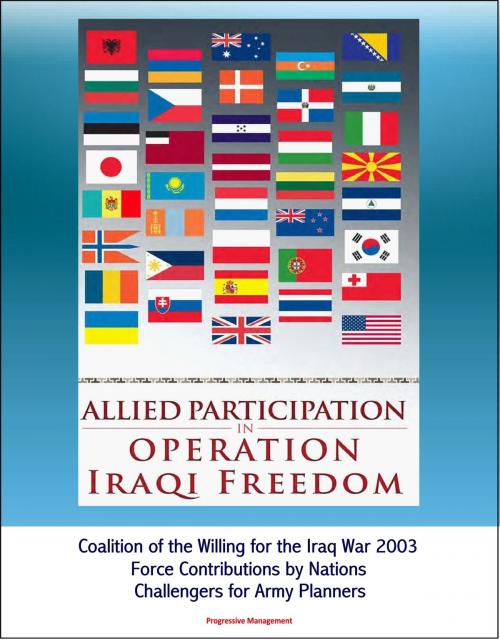Allied Participation in Operation Iraqi Freedom: Coalition of the Willing for the Iraq War 2003, Force Contributions by Nations, Challengers for Army Planners
Nonfiction, History, Military| Author: | Progressive Management | ISBN: | 9781310767616 |
| Publisher: | Progressive Management | Publication: | August 16, 2014 |
| Imprint: | Smashwords Edition | Language: | English |
| Author: | Progressive Management |
| ISBN: | 9781310767616 |
| Publisher: | Progressive Management |
| Publication: | August 16, 2014 |
| Imprint: | Smashwords Edition |
| Language: | English |
The invasion of Iraq in March 2003—Operation Iraqi Freedom—was controversial at its start. The United Nations was reluctant to provide a specific endorsement for direct U.S. military action. Without this authorization, a number of close allies refused to participate in the operation. In order to garner greater support and provide an international flavor to the intervention, President George W. Bush assembled a "coalition of the willing," ultimately involving about sixty nations. Although some of these countries supplied little more than nominal assistance, fully thirty-seven of them furnished a total of around 150,000 ground forces from the start of the operation through July 2009. These troops conducted security operations; provided reconstruction assistance; operated command-and-control headquarters; and fought, were wounded, and killed alongside U.S. soldiers, sailors, airmen, and marines. This temporary alliance was more than just a paper coalition; it involved substantial and important support from our international partners in helping achieve U.S. war aims. It is important that the United States Army and the American people know about and remember the sacrifices of these allies. Allied Participation in Operation Iraqi Freedom highlights a number of key aspects of allied support to the U.S.-led operation. The presence of ground forces from so many coalition partners allowed U.S. combat forces to focus their generally superior capabilities in more contested sections of the country. This division of labor served American ends while still ensuring that our partners performed vital work that fully justified their commitment to Iraq's security. These combined operations also strengthened the ties between countries and improved the quality of interoperability between U.S. and coalition troops. Allied support played an important role in stabilizing the situation in Iraq.
This short study also underscores the significant challenges that U.S. Army planners faced in Iraqi Freedom in integrating a host of different military partners into U.S. operational plans. Similar issues of working together in a complex military environment will doubtless reoccur in future operations, but the benefits of assembling such coalitions will almost certainly outweigh the problems. The United States cannot fight alone in the current operational environment, and improving the quantity and quality of our interaction with our international partners should continue to be a high priority. I commend this monograph to today's Army to read, gain insight into such combined operations, and reflect on how much support our allies can provide in future military endeavors.
Introduction * Allied Participation in Operation Iraqi Freedom * Overview * Formation of the Coalition of the Willing, November 2002-March 2003 * Major Combat Operations: Coalition Forces Land Component Command, March-May 2003 * Combined Joint Task Force-7, June 2003-May 2004 * Multi-National Force-Iraq, May 2004-July 2009 * Analysis * Force Contributions by Nations * Albania * Armenia * Australia * Azerbaijan * Bosnia-Herzegovina * Bulgaria * Czech Republic * Denmark * Dominican Republic * El Salvador * Estonia * Georgia * Honduras * Hungary * Italy * Japan * Kazakhstan * Latvia * Lithuania * Macedonia * Moldova * Mongolia * The Netherlands * New Zealand * Nicaragua * Norway * Philippines * Poland * Portugal * Republic of Korea * Romania * Slovakia * Spain * Thailand * Tonga * Ukraine * United Kingdom * Further Readings * Abbreviations
The invasion of Iraq in March 2003—Operation Iraqi Freedom—was controversial at its start. The United Nations was reluctant to provide a specific endorsement for direct U.S. military action. Without this authorization, a number of close allies refused to participate in the operation. In order to garner greater support and provide an international flavor to the intervention, President George W. Bush assembled a "coalition of the willing," ultimately involving about sixty nations. Although some of these countries supplied little more than nominal assistance, fully thirty-seven of them furnished a total of around 150,000 ground forces from the start of the operation through July 2009. These troops conducted security operations; provided reconstruction assistance; operated command-and-control headquarters; and fought, were wounded, and killed alongside U.S. soldiers, sailors, airmen, and marines. This temporary alliance was more than just a paper coalition; it involved substantial and important support from our international partners in helping achieve U.S. war aims. It is important that the United States Army and the American people know about and remember the sacrifices of these allies. Allied Participation in Operation Iraqi Freedom highlights a number of key aspects of allied support to the U.S.-led operation. The presence of ground forces from so many coalition partners allowed U.S. combat forces to focus their generally superior capabilities in more contested sections of the country. This division of labor served American ends while still ensuring that our partners performed vital work that fully justified their commitment to Iraq's security. These combined operations also strengthened the ties between countries and improved the quality of interoperability between U.S. and coalition troops. Allied support played an important role in stabilizing the situation in Iraq.
This short study also underscores the significant challenges that U.S. Army planners faced in Iraqi Freedom in integrating a host of different military partners into U.S. operational plans. Similar issues of working together in a complex military environment will doubtless reoccur in future operations, but the benefits of assembling such coalitions will almost certainly outweigh the problems. The United States cannot fight alone in the current operational environment, and improving the quantity and quality of our interaction with our international partners should continue to be a high priority. I commend this monograph to today's Army to read, gain insight into such combined operations, and reflect on how much support our allies can provide in future military endeavors.
Introduction * Allied Participation in Operation Iraqi Freedom * Overview * Formation of the Coalition of the Willing, November 2002-March 2003 * Major Combat Operations: Coalition Forces Land Component Command, March-May 2003 * Combined Joint Task Force-7, June 2003-May 2004 * Multi-National Force-Iraq, May 2004-July 2009 * Analysis * Force Contributions by Nations * Albania * Armenia * Australia * Azerbaijan * Bosnia-Herzegovina * Bulgaria * Czech Republic * Denmark * Dominican Republic * El Salvador * Estonia * Georgia * Honduras * Hungary * Italy * Japan * Kazakhstan * Latvia * Lithuania * Macedonia * Moldova * Mongolia * The Netherlands * New Zealand * Nicaragua * Norway * Philippines * Poland * Portugal * Republic of Korea * Romania * Slovakia * Spain * Thailand * Tonga * Ukraine * United Kingdom * Further Readings * Abbreviations















